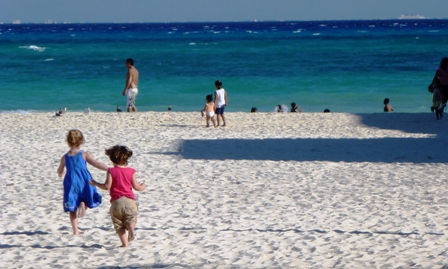Learning to Scuba Dive in Iowa
After several minutes sitting alone on the bottom of the pond watching bubbles float up from my regulator I felt a sharp tap on the back of my head. I thought my scuba instructor, Craig, had returned without me noticing, but when I turned around there was only a small fish floating in front of my face. A Bass maybe? Wisps of my drifting hair must have looked good to eat, and it had been nipping at my head. I gave it my best cross-Mommy scowl and shook my finger at it, then turned to find Craig coming through the weeds. I hoped he didn’t see my silent conversation with a fish.
My father talked his whole life about learning to scuba dive. He subscribed to Scuba magazine, watched TV shows about it (if you haven’t seen Sea Hunt you’re missing out,) but never got around to actually doing it. Now in his mid-60’s he’s carrying a lot of extra weight and tires easily. He smoked most of his life so his lungs aren’t the greatest. He has an enlarged heart, asthma and Type 2 diabetes among other inconveniences that make it unlikely he will ever get into the water. He talked and dreamed and waited too long.
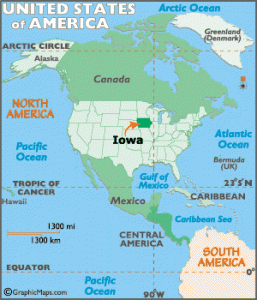
I didn’t want that to happen to me, so in 2010 I convinced my husband Jason that we should get certified through a community education program. I tempted him with the end goal of a romantic trip to Jamaica for our first ocean dive. We spent every Saturday for eight weeks in the city pool with Craig wearing borrowed wetsuits and learning to use scuba gear piece by piece.
It wasn’t as easy as I thought it would be. I discovered that I had an alarming aversion to water going up my nose that would cause me to come rocketing out of the shallow end of the pool like someone had yelled “Shark!” if my sinuses got a little damp. One of the first skills we had to learn was to “clear” the mask by first allowing water into it and then blowing through your nose to push it out again. It was one of the hardest skills for me as I fought the water trying to enter my nose, and I felt ridiculous as I struggled not to panic. I had to practice in our backyard pool at home and a few times I even tried it in the bathtub.
Craig quickly taught us not to wear our masks pushed up on our foreheads like those cool people you see on TV because that’s a good way to have it knocked off by a wave and sent to the bottom, ending your diving for the day. He gave us each one freebie, and the second time he caught you with a mask for a headband you owed him a beer. We ended up buying him a six-pack, but to this day I automatically shove my mask down around my neck and wear it like a necklace. Another option for safekeeping is to loop it on your arm up by the elbow like a handbag, but I like my arms free for swimming.
Being under the water wasn’t a problem for either of us; I’ve always been a strong swimmer and liked to dive for things on the bottom of the pool. Breathing through a pressurized tube took some getting used to, though. Sucking air through a scuba regulator feels like an asthma attack and sounds like Darth Vader. Even now when we go diving I tell the dive master that I need to spend a few minutes on the surface so I can acclimate to the feeling.
When we got to our training in the deep end I felt like a fish. I loved being able to stay down without working to be submerged or leaving to catch my breath. I could let the weight of my gear settle me on the bottom or pump a little air into my buoyancy control vest (BC) and float at whatever level I chose (with some trial and error.) I could take my mask completely off and put it back on without breaking my calm, and learned to do the same with all of my gear while ten feet down. I was a clumsy mermaid looking up at the sky through silver ripples.
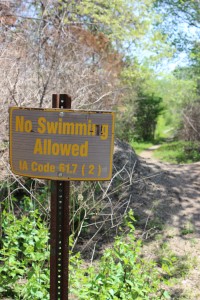
By the time we passed our written exam I was so excited to get in water with something more than chlorine in it, I didn’t really care where it was. Craig decided to take us out to Banner State Park and Shooting Range a few miles outside of town. An old quarry, the water was relatively clear and we wouldn’t have to drive hours away.
As we drove through the park it didn’t look like a place anyone would want to dive. Dead trees poked out of the greenish water but Craig said he had tried all the ponds at one time or another and knew a good spot. We parked in a dry area and readied our gear, checking our air tanks and getting our wet suits on. We’d have to haul our gear and hike through the trees a little to get to the spot Craig had in mind, so the wetsuits would serve double duty by protecting us from poison ivy. We passed a sign that said “No swimming,” but Craig pointed out that we really weren’t swimming so we could over look it.
At the edge of the pond we pulled on our masks, slipped regulators in our mouths and backed into the water, floating as soon as we could to avoid stirring up the bottom. After a few last-minute instructions it was time to descend. The three of us sank slowly past green fronds and settled into the mud, a small cloud rising as we landed. It was beautiful.
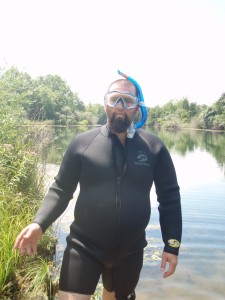
Jason and I had to show that we could perform all that we had learned, so using hand signals Craig asked us each to demonstrate mask clearing and removal, taking the regulator out of your mouth underwater, putting it back in and clearing out the water, and emergency air sharing.
Then the hardest part: taking off the BC with all the gear attached to it as if there was a problem to fix, then putting it back on. This removes all the weight that holds you down, as well as giving you a half-inflated vest balloon to wrangle underwater. Jason unbuckled his vest and took it off, but it all tried to float away and got out of control. The last I saw of him was a cloud of silt as he kicked and flipped in pursuit of his gear. Craig put his palm in my face like Tina Turner, a clear sign to stay put, and disappeared into the cloud after him.
I was alone on the bottom of the pond with no idea what was going on. It was only about 10 or 12 feet deep, and I was too enthralled with being there to be afraid. I sat content, breathing slowly, and waited for several minutes. I was reluctantly starting to wonder if maybe I should surface and make sure Jason was alright when my friend the fish decided I might be edible.
Craig did see me scolding the Bass, but he was impressed that I had stayed. He told me many new divers, especially a woman, would have panicked at being left alone. I found it serene and beautiful, and it never occurred to me to be afraid. To be able to sit on the bottom of a pond and watch the watery weeds and fish without worrying about when I’d have to swim up for a breath was amazing. I trusted Craig to come back for me, so I enjoyed my free time on the bottom.
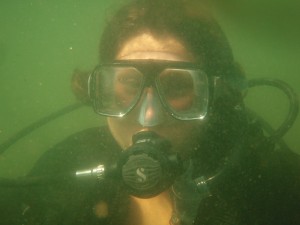
I passed the last test with flying colors, and Craig declared us certified divers. As he waded up toward the beach I felt a pang that it was over so fast. Feeling like a child, I asked the classic question: “Can we do it again?” Why waste the gear and the air left in the tanks? This was another thing that Craig told me later made him sure I would be a good diver; even in a muddy Iowa pond I was having fun and wanted to keep going. We played underwater and took some pictures to commemorate the occasion, but eventually Craig had other things to do that day.
Jason and I went to Jamaica a month later. Living so far from the ocean we don’t make it into the water very often, so 4 years later we’re still novices. That will be one big advantage of living in Cozumel. When we move there I plan to not only get to know the reefs by heart but to make the most of our proximity to Isla Mujeres during the Whale Shark migration, as well as Roatan, Belize and the underwater statues in Cancun. There’s a whole world out there that we never see from above the water.
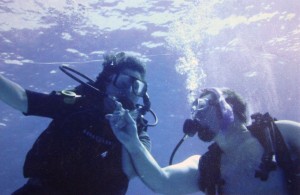
When I talk about diving people offer reasons why it wouldn’t work for them, why they’re afraid to try it. Diving is a sport. I’m really lousy at volleyball but that doesn’t mean I refuse to play. It takes time to learn all the rules and get comfortable, and it takes practice.
I’ve told you about my struggles so that if you do start a class and struggle with it, you’ll know that you aren’t the only one who does. That doesn’t mean you can’t dive. If it was easy you wouldn’t have to take a class to learn it, but keep trying and then keep diving.
Learning to scuba dive is one of the best things I ever did for myself. It makes you part of the ocean in a way that nothing else can, it connects you to the watery world that surrounds you and makes you care about it. The ocean needs more of that, and so do you. Your inner fish will thank me.
